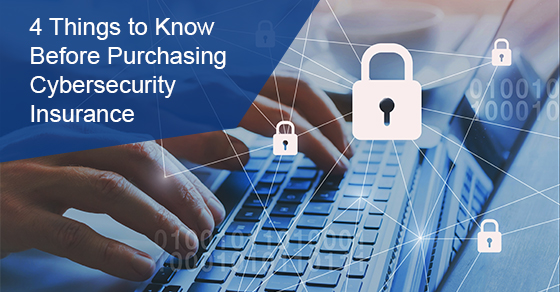
4 Things to Know Before Purchasing Cybersecurity Insurance
Posted by on Jun 08, 2020 in
A cybersecurity breach is every company’s worst nightmare. Someone hacks into your systems and steals information – anything from medical records to credit card details. If your digital systems are breached, you could face all of the following, which are time-consuming and expensive to deal with:
- Reputation damage
- Business downturn
- Lawsuits
- Lost revenue
- Recovery efforts
- Loss of assets
- Potential regulatory fines
- If you need cybersecurity insurance
- Why your current insurance isn’t enough
- What the most common areas of coverage are
- How Oegema Nicholson can help you craft the perfect cybersecurity policy
Do you need cybersecurity insurance?
You may think that only big operations, such as banks and credit card companies, need cybersecurity insurance. However, if you have almost any kind of information stored electronically, you can benefit from cybersecurity insurance. Hackers can go after all kinds of information, such as:- Your customer’s personal information – such as a name, email, phone, and address
- Medical records
- Financial records
- Payment information — credit card numbers, bank account information
- Government documentation, like a driver’s license or SIN number
Why Your Current Insurance isn’t Enough
You already have insurance for your business – general liability or property insurance – or both. However, those types of insurance are meant to cover you from damage to either people or physical property — such as a building or equipment. They are not meant to cover things like data or electronic systems. This is where we at Oegema Nicholson can help guide you. We can review what your current policy does and does not cover, and help you purchase additional cybersecurity insurance to make sure you are properly protected.Most Common Areas of Coverage
There are many different aspects of cybersecurity insurance coverage. That’s why it’s so important to work with an insurance company, like Oegema Nicholson, to make sure you know what kind of coverage you need and how it works. Here are some areas where cybersecurity insurance can help you.- Data breach and the fallout from it
- Privacy crisis management: informing your customers about what happened
- Business interruption: where you cannot conduct business due to a data breach
- Third-party liability: this helps cover the cost of being blamed for a breach
- First-party coverage: this covers costs associated with being hacked – anything from informing clients of the breach to dealing with lost revenue.
- Cyber theft and cyber extortion coverage: holding data for ransom is a very common problem these days — even places like hospitals are not immune to it
- Network security liability and network extortion: this can include costs or losses associated with unauthorized access to your network, unauthorized transactions, and Denial of Service (D.O.S. attacks)
- Virus and hacking liability coverage: if you are impacted by a virus or accidentally infect a client’s system with a virus, this coverage will protect you
- System and data restoration costs coverage: this can help with the costs associated with retrieving data or restoring it from backup locations
Purchasing Cybersecurity
We hope you’ve found this article on cybersecurity insurance informative and helpful. We’ve talked about the following:- How to know if you need cybersecurity insurance
- Why your current insurance isn’t enough to cover your cybersecurity risks
- What the most common areas of coverage are

